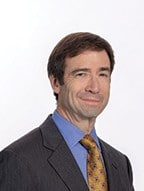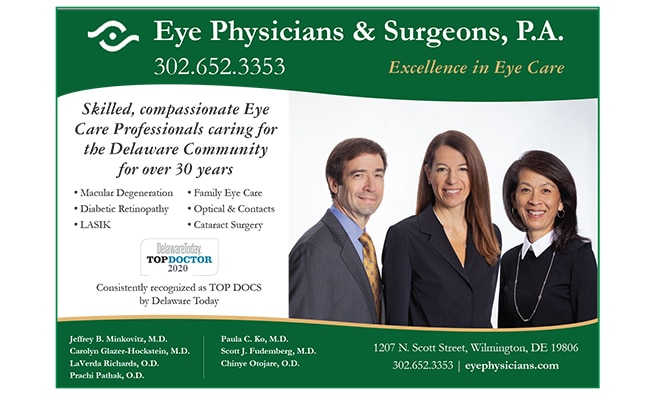Presbyopia – A Renewed Focus Of Eye Care Innovation

By Jeffrey B. Minkovitz, M.D.
Presbyopia is the age-related inability to focus on objects up close. This gradual change affecting every individual, usually after age 40, is due to stiffening of the lens in the eye. Those who do not need glasses to see far away must wear reading glasses to read and see objects up close. While nearsighted individuals can read without glasses, they need glasses to see in the distance. Clear vision both near and far becomes no longer possible. There are nearly 2 billion people with presbyopia on earth, making this the most common ocular condition and a source of great frustration.
Until now, the most common way to compensate for presbyopia was glasses: reading glasses for those who don’t need distance correction, separate glasses for near and far tasks for those who do wear distance prescriptions, or bifocals (with different segments for near and far vision). Bifocals are not new, originally invented by Benjamin Franklin, but designs and technology have improved. Contact lenses are also an option; multifocal or bifocal lenses allowing near and far vision, or monovision (using one eye for distance and one eye for up close) in those who can tolerate this compromise.
More recently, surgical options were developed. Multifocal implants, used to replace the cloudy natural lens at the time of cataract surgery, allow some restoring of focusing ability. Since first approved by the FDA in 2005, continued improvements have improved results and reduced common complications including glare and halos at night.
Also in the early 2000s, Near Vison CK was approved by the FDA. Using gentle radio frequency energy, the cornea is reshaped to create a blended version of monovision. I introduced this to Delaware shortly after approval, and many people enjoyed restored function. However, while effective and safe, the procedure failed to gain widespread acceptance due to its only temporary benefit, and the procedure is now no longer available. Laser vision correction, typically performed to improve distance vision without glasses, can instead be used to create monovision (one eye for near and one for distance). Monovision can also be achieved after cataract surgery by choosing implants setting a different focal distance for each eye. Any surgical options, being more invasive and less temporary, require careful evaluation for individual suitability and a discussion of risks and benefits.
After years of directing more attention toward reducing spectacle dependence for distance vision, innovation in eye care appears to be shifting focus to presbyopia management.
At least seven different medications (in eye drop form) are currently in development, with one already FDA approved in 2022. Most of these drugs constrict the pupil (or prevent dilation in low light) creating a pinhole camera effect, expanding the range of focus. One drop under development aims to restore the elasticity and focusing ability of the lens in the eye. Several surgical approaches are also under investigation, including new ways to reshape the cornea or to soften the lens using lasers. Finally, continued improvements in multifocal lenses for cataract surgery (or even for refractive lens exchange for individuals without cataracts) have improved near vision function with fewer side-effects.
Ophthalmology remains on the forefront of medical innovation. A careful examination and a thoughtful conversation of goals and options is important to determine best, individualized options and to allow patients to make informed decisions. Practitioners with experience and, as with any therapy, an understanding of patient needs is vital to achieving ideal results. For further information or to schedule an appointment please call 302-652-3353 or visit www.eyephysicians.com.
Bio
Dr. Jeffrey Minkovitz specializes in corneal, cataract, and refractive surgery. A partner at Eye Physicians and Surgeons, P.A. since 1996, he is also on the staff of Christiana Care and the Center for Advanced Surgical Arts, where he serves on the medical advisory board. After graduating Magna cum Laude from Harvard University, Dr. Minkovitz received his medical degree from the University of Massachusetts Medical School. He then served his medicine internship at Harvard’s Mt. Auburn Hospital, his ophthalmology residency at Washington University, and a cornea and refractive surgery fellowship at Wilmer Eye Institute of Johns Hopkins. As an assistant clinical professor at Johns Hopkins University, Dr. Minkovitz received the Outstanding Teacher Award. He was also named Top Doc in ophthalmology by Delaware Today Magazine for six consecutive years, and has been an instructor at American Academy of Ophthalmology Annual Meetings.
In addition to laser vision correction for nearsightedness, farsightedness and astigmatism, Dr. Minkovitz performs the most advanced cataract surgery, including the newest laser cataract surgery and advanced technology lens implants. He is also one of only a few Delaware surgeons trained in corneal transplants, and he screens for and treats a variety of eye diseases.
Dr Minkovitz is known for numerous Delaware firsts including PRK laser vision correction, NearVision CK, and newer less invasive techniques for corneal transplantation including DSEAK, DMEK and DALK. Together with his Center for Advanced Surgical Arts partner and co-founder, Dr. Minkovitz introduced laser cataract surgery to Wilmington, Delaware in 2012. In 2016, Dr. Minkovitz founded Laser Vision Delaware, LLC, once again raising the bar and bringing a newer, faster and more accurate refractive laser to Delaware.
A native of Boston Massachusetts, Dr Minkovitz has called Wilmington, Delaware home for 25 years. He was drawn to medicine by his fascination and aptitude in science, and by his desire to improve the lives of others. Ophthalmology piqued his interest early on in medical school, as the specialty offers an appealing combination of surgical and medical care, advanced technology, and in particular the joy of being able to impact lives through restoring and enhancing vision. Dr Minkovitz also enjoys the ability to follow and really get to know his large cohort of patients. When not at work, Dr Minkovitz enjoys spending time with family, as well as swimming, playing tennis, and continuing his photography hobby.
For further information or to schedule an appointment please call 302-652-3353.


